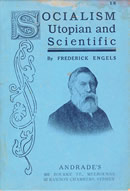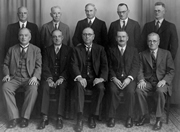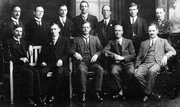

On the train from Perth to Kalgoorlie

A steam train on the Trans Australian Railway east of Kalgoorlie. On this occasion, Curtin's trip ended before he could board for the long haul eastward.
JCPML. Records of Alex McCallum. Steam train, 192? JCPML00830/175/136
Leaves for eastern states for tour by journalists of an irrigation scheme. 2
Curtin was forced to abandon the trip at Kalgoorlie due to ill-health which had been 'far from good during recent months, and the Perth contest did nothing to improve it. Even on the train to Kalgoorlie he would have had a bad time but for the attention given by J B Coatham, of Boulder,' who 'did everything possible for Curtin.' 3
Returns to Cottesloe from Kalgoorlie.
After a few days rest Curtin tried to travel again, but was 'prevailed upon by a doctor to turn back'. He was advised 'not to mingle with the multitude, read papers, or leave his happy home' for a month. 4
Alexander Needham took over much of Curtin’s editorial duties in this time. 5
At home in Cottesloe.
Is 'improving at his Cottesloe home. By his efforts in the literary and political arena, John has undermined his health.' 6
Convalescing.
Spends '…this week in the tall timber. His doctor suggested that a few days in the country would have a good effect…' 7
Convalescing.
'Has not been in Perth for some weeks. His doctor advises rest and quietness.' 8
Is well enough to again attend committee meetings of the Australian Journalists’ Association. Elected State President.
Curtin joined the AJA when he became editor of the Westralian Worker in February 1917. He was elected to the committee in August 1917, became Vice President in June 1919 and served as President from June 1920 to August 1925. 10 Committee meetings were held as frequently as once a week, usually Tuesday lunchtimes at the AJA city office. For example, during the financial year 1921-22 the committee met thirteen times although Curtin only managed to attend seven meetings. The following year there were 27 meetings of which Curtin attended 23. Although he remained on the committee after his resignation as president, he attended only four meetings in 1926.
At the Shareholders meeting of the People's Printing & Publishing Company on the 23 June 1920, Chairman of the Board of Directors, Mr J.B. Holman, and Director Mr W.D. Johnson, commented on Curtin's work as Editor.
Mr J.B. Holman - I would like in addition to congratulate the Manager and Staff on the last years operations. Mr. Curtin has done splendid work as Editor, and all things considered the Shareholders must feel satisfied with the present position.
Mr W.D. Johnson ... said that as a Director he was satisfied with our present position and contended that we must push further ahead and not rest until we succeed in establishing a Labor Daily in this State.
He believed that the Labor Movement should educate its own Journalists. Curtin was a good man to be under and while Mr. P. O'Loghlen had done good work in the absence of the Editor still he could not be regarded as an understudy. 10a
After about three years in a rented home at 3 Napier Street, moves house to 15 Napier St, Cottesloe, just a few doors further along the street. Elsie's parents, who are living with the Curtins, help financially with the purchase - the house is bought in Elsie's name.
'It was during "Dad's" illness after the 1919 election campaign that we shifted a few doors down to another house in Napier Street, Cottesloe.' 10b
Sunday 21 July
evening
Saturday 27 August
8 pm
Gives address entitled 'The Art of Expression' to inaugural Study Class.
'In addition to the encouragement of public speaking, the class purposes to pursue the study of socialist philosophy, and to develop debating and conversational talent. All desirous of understanding the Labor position, and of cultivating the art of expressing themselves clearly are invited to attend. 12
Following the address there was a 'general discussion on the materialist conception of history. The reading of a story from Tolstoy concluded a pleasant and instructive evening.' 13
Sunday 5 September
evening
Speaks on 'The Destructive and Constructive Genius of Labor.'
'Last Saturday’s inclement weather did not prevent a large attendance at the Literary Institute, where a bright musical programme, kindly contributed by Mrs Marlow, Misses Summer and Trenoweth, and Mr McKey, formed the prelude to an interesting lecture. … In showing that all civilisations were ultimately founded on labor, the speaker drew an interesting parallel between Roman roads and the Roman Empire. The Roman road had gone the way of all empires. All civilisations in the past had only progressed in so far as the tools of Labor had been improved, and while there was a very real dignity attached to labor our present day conception of life quite ignored it.' 14
6-10 September
Curtin 'demonstrated that unions cannot any longer afford to treat the Worker as a thing apart from the business of Trades Unionism. A dumb movement is at as great a disadvantage as a dumb man … At this time the Worker newspaper company were going behind to the extent of £600 a year and were approaching bankruptcy'. 15
The ground floor of the Westralian Worker building in Stirling Street was 'given over to the printing press and linotype machines that produced the weekly Worker and several other publications ranging from the feminist magazine, Dawn, to a Country Party newspaper. To cover their costs, they also did job printing of cards and other material for any customers who fronted up to the counter. … Despite a satisfying rise in the Westralian Workers circulation, the paper became beset by serious financial difficulties by mid-1917 as the price of newsprint quadrupled. By July 1917 it was clear that if things were left as they were, the more copies that Curtin managed to sell, the greater the loss would be incurred. So the cover price was doubled and appeals made to unions to pay annual subscriptions on behalf of their members. … Part of the paper’s success had been due to it coming out on a Friday, the day before the horse races were run, and carrying extensive racing news and betting tips. The paper also carried theatre and film reviews for readers seeking weekend entertainment. But those were peripheral to its political purpose and Curtin swiftly set about making it a powerful propaganda weapon for the socialist cause.' 16

Two editions of Engles' work are found in the Curtin family library.
The cover of the 1918 edition is shown here.
JCPML. Records of the Curtin family. Socialism: Utopian and Scientific by Frederick Engels. Melbourne: Andrade's, 1918. JCPML00001/87.
Holds Speakers Class.
'Mr Curtin gave many valuable hints to budding speakers. The class adopted as a text book, "Socialism, Utopian, and Scientific," by F. Engels.' 17
Thursday 23 September
evening
Saturday 26 September
afternoon

Great Southern Roller Flour Mills,
North Fremantle, c1920.
Courtesy Fremantle City Library Local History Collection Photo Nol LH000318
Saturday 23 October
evening

JCPML. Records of Alex McCallum. Second Collier Government, Western Australia, 1933. Harold Millington standing 3rd from left. JCPML00830/4
Speaks at a 'fairly representative' meeting in support of Mr Harold Millington’s candidature for Leederville. 21
Harold Millington was Deputy-Premier of Western Australia from 1938-1943 and Collier’s Minister for Agriculture. He was also a union trustee for many years.
Hosts function on behalf of AJA to thank E.O. G. Shann (historian) and essayist Walter Murdoch for their lectures to journalists.
In Shann’s early professorial years at the University of Western Australia, his liberal views earned him the undergraduate nickname of 'Bolshie Teddy'. He brought 'warm enthusiasm' to lecture rooms, small classes or groups which met at his home in South Perth. 'He had a ready twinkle – sometimes a wicked twinkle – in his eye and was quick to see a joke at his own expense.' He was a 'keen supporter' of the Workers’ Educational Association. 22
Murdoch had the capacity to inspire confidence and lead 'younger men to reveal their half-baked ideas on matters administrative and philosophical.' 23
